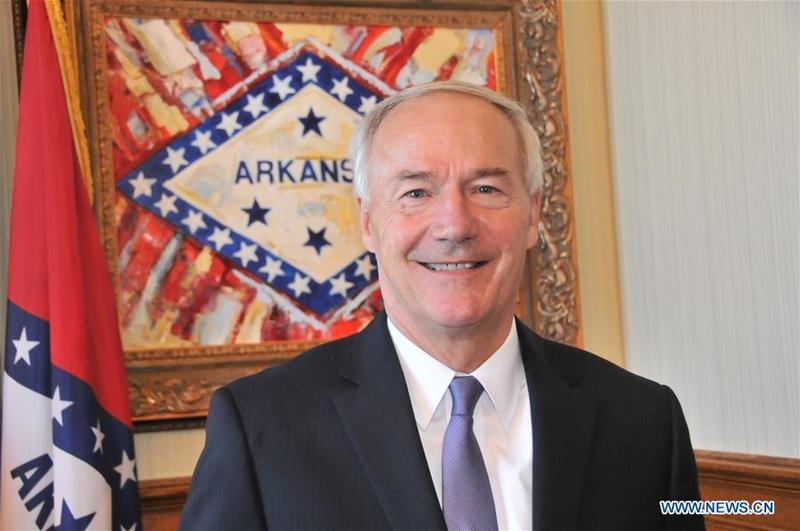 Arkansas Governor Asa Hutchinson is pictured during an exclusive interview with Xinhua in Little Rock, Arkansas, the United States, on Oct 23, 2017. (LIU LIWEI / XINHUA)
Arkansas Governor Asa Hutchinson is pictured during an exclusive interview with Xinhua in Little Rock, Arkansas, the United States, on Oct 23, 2017. (LIU LIWEI / XINHUA)
Whoever wins the upcoming US presidential election should try to reengage with China, and prevent the chill in relations from turning to ice, said Arkansas Governor Asa Hutchinson.
The Republican governor made the remarks during an online discussion hosted by the Brookings Institution on Oct 15 in which a bipartisan group of policymakers weighed the risks and opportunities of Washington's policy toward Beijing and generally spoke against decoupling of the two economies.
Noting that the United States' recent unfavorable attitude toward China "has been shaped by the public debate by our national leadership", Hutchinson said political leaders need to act.
Both the incumbent Republican President Donald Trump and his challenger, Democrat Joe Biden, have used China-bashing rhetoric and actions as tactics to court support in the Nov 3 election.
ALSO READ: Insults and interruptions mar first Trump-Biden debate
"I think after the election is over with, whoever is elected, I would hope that one of the first things on their agenda is to try to reengage at least in conversations with China's leadership, trying to reengage on some of the trading negotiations, and not have that chill being moved to a frozen state in our relationship," Governor Hutchinson said. "That takes national leadership, and bipartisanship can follow that."
At the moment, relations between the two largest economies have dropped to their lowest point since the two countries forged diplomatic relations in 1979, with some US politicians portraying China even as an enemy, culminating in the shuttering of a consulate in each other's country in July.
"It is a complicated relationship with a lot of different nuances to it. But we have an interconnected economy. And while we need to make sure that we can produce pharmaceuticals here in the United States, that we move essential manufacturing here, we still want access to that economy, and not simply try to freeze them out," Hutchinson said.
The governor also said the two countries should work together if possible on global security, and the US needs to resort to "the rule of law" and trading rules when it comes to alleged intellectual property theft and regional security issues.
"I don't think it leads to decoupling; it leads to better rules enforcement of what we're trying to accomplish," he said.
We need to deal with China's growth not only because of our economic interest, but because our environment here in America depends on it as well.
Nan Whaley, mayor of Dayton, Ohio, the United States
Mayor Nan Whaley of Dayton, Ohio, said the US-China relationship has been politicized by the current administration, making it difficult to engage in a "nuanced approach" to a rising China.
"We need to think about how to make America competitive and resilient," she said. "Part of that is managing our relationship with China and with other trading partners, but most of it is related to policies and programs here at home."
The mayor offered another perspective on the bonds between China and the US, both major emitters of greenhouse gases, by pointing out:"You can't decouple the atmosphere".
"So we need to deal with China's growth not only because of our economic interest, but because our environment here in America depends on it as well," the mayor said."I fear to see what leverage we would have with the Chinese without our trading relationships. So decoupling would be really problematic there."
Overall goal
On what is most needed to be achieved with China and what to avoid, Whaley said the overall goal should be a positive relationship that works toward resolving the issues of today.
"Once we have a new normal, we can talk about next steps. I think both China and the US should work hard to prevent the current competitive relationship from turning into something that is confrontational," she said."We should not try to make an enemy out of China."
US Congressman Rick Larsen of Washington said that there are three different types of people on Capitol Hill when it comes to dealing with China-people who want to punish China with more tariffs, those who want to decouple the economic relationship and those who are trying to salvage the relationship.
Larsen, who has visited China at least 11 times, said he and Darin LaHood, a Republican congressman from Illinois and another co-chair of the US-China Working Group, are trying to salvage the relationship, working for a relationship that is "still very important but still has strong elements of a competition".
"When the US-China relationship sneezes, Washington state gets a cold," Larsen, a Democrat, said of the impact of the trade war on his constituents. The Pacific Northwest state has had a booming agricultural export business with China over the years.
In August, the US-China Business Council said in its annual member survey that nearly 70 percent of US businesses operating in China expressed optimism about market prospects, and 87 percent reported that they had no plans to shift production out of China.
READ MORE: China committed to sound, stable growth of Sino-US ties
Contact the writer at huanxinzhao@chinadailyusa.com


